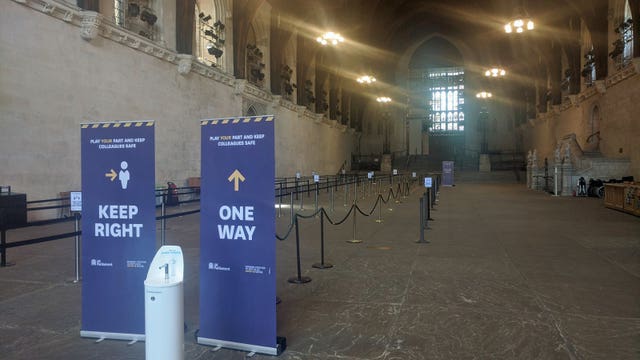Boris Johnson is facing a possible Tory revolt over plans to end online voting for MPs during the coronavirus crisis, as the Government came under criticism from the equality watchdog.
Senior Conservatives including a former Cabinet minister have tabled amendments to Government plans to force parliamentarians into the Commons in order to vote when they return from recess on Tuesday.
The Equality and Human Rights Commission (EHRC) wrote to all MPs to “raise our concern” ahead of a vote on the move, saying it “cannot be right” to exclude elected representatives.
The watchdog warned it would “place at significant disadvantage” MPs who are shielding or self-isolating due to age, disability, health or pregnancy, as well as those who will struggle to travel to Westminster.
To be clear, I agree with @Jacob_Rees_Mogg that Parliament should return, especially since Government is asking for phased opening of schools. But those MPs genuinely affected by Covid-19, i.e. sick, shielding, or self isolating, should be able to vote online or via proxy👇 https://t.co/S0VL3SIUE9
— Robert Halfon MP -Working Hard for Harlow- (@halfon4harlowMP) June 1, 2020
The proposal announced by Commons Leader Jacob Rees-Mogg could see parliamentarians forming kilometre-long queues in order to obey social distancing rules – despite the Lords planning a move online.
Robert Halfon is among the senior Tories who say the move will turn individuals who, like him, are shielding and those who are ill or self-isolating into “parliamentary eunuchs”.
The chairman of the Education Select Committee accused Mr Rees-Mogg and his superiors of lacking empathy, and displaying a “tough luck, we don’t care” attitude.
“Clearly in this case, sadly, Jacob and the powers that be are being harsh and unbending. The MPs who genuinely cannot come in, our democratic rights are being snipped away and we’re being turned into parliamentary eunuchs,” Mr Halfon told the PA news agency.
“Not only will the hundreds of MPs, who for one reason or another will not be able to come in because they are affected by Covid, be denied their fundamental rights, but their constituents will not have a voice in Parliament because they will not be able to vote.”
Rees-Mogg’s bizarre airport style queue system around parliamentary estate for voting later – when MPs could vote perfectly well by clicking a button on our computers. (We’ve done it before and it works fine) pic.twitter.com/OmR1UfQIju
— Jeff Smith (@JeffSmithetc) June 2, 2020
Mr Halfon, who said he was advised not to return by his GP, is backing moves to allow digital voting to resume in amendments to Mr Rees-Mogg’s motion led by Conservative former Cabinet minister Karen Bradley.
The chair of the procedure committee’s move is backed up by Caroline Nokes and Julian Knight, the Tory MPs who chair the women and equalities, and the digital, culture, media and sport committees, respectively.
EHRC chief executive Rebecca Hilsenrath called on MPs “to show leadership in championing equality and non-discrimination” when voting on the Government plans to ensure Parliament “remains inclusive”.
“We are concerned by the announcement today from the Leader of the House of Commons which implies that Parliament may proceed without provision for the remote participation of Members who are unable to travel to Westminster because of the pandemic,” she wrote.
“This will place at significant disadvantage MPs who are shielding or self-isolating because of age, disability, health conditions or pregnancy, as well as other Members who will struggle to attend the chamber in person due to travel restrictions and caring responsibilities.

“It cannot be right for Parliament to proceed without provision for remote participation, when many elected representatives cannot attend in person.”
In a joint statement, Mr Halfon and Labour’s shadow minister for disabled people Vicky Foxcroft urged the Government to re-think plans to end digital voting.
“What stronger message can you get than the EHRC, one of the Government’s own non-departmental public bodies, confirming that the ending of remote participation for those of us who are shielding or otherwise unable to attend Parliament is discriminatory?”
The authorities at great effort created the capabilities for a hybrid Parliament to function. Nobody was disenfranchised. What the UK Govt is doing this week is farcical. They must come to their senses and allow all MPs to participate by continuing with the hybrid arrangements. https://t.co/sDbijPCRSi
— Ian Blackford (@Ianblackford_MP) June 1, 2020
Mr Rees-Mogg told his ConservativeHome podcast that he was planning to introduce measures to allow shielding MPs a way to play a limited role in Commons proceedings.
He said the changes were necessary because legislation was on a “go slow” due to constraints on committees operating, with only around a third of the usual level of legislative activity.
“We would simply not have been able to deliver on the manifesto if we had not brought Parliament back,” Mr Rees-Mogg said.
Mr Rees-Mogg told the Commons he would table a motion on Wednesday which would enable MPs unable to attend Parliament on medical grounds to take part in certain proceedings.
Commons Speaker Sir Lindsay Hoyle was forced to draw up plans to allow MPs to safely vote on the proposals in person on Tuesday, but he has called on the Government and Labour to agree on a safe compromise.




Comments: Our rules
We want our comments to be a lively and valuable part of our community - a place where readers can debate and engage with the most important local issues. The ability to comment on our stories is a privilege, not a right, however, and that privilege may be withdrawn if it is abused or misused.
Please report any comments that break our rules.
Read the rules hereLast Updated:
Report this comment Cancel